World Heritage Beech Forest in Germany
Germany is home to about 26% of Europe’s red beech forests, making it the core area of this tree species, which thrives particularly well in the temperate climate of Central Europe. Numerous types of beech forests are found exclusively in Germany, representing a significant portion of the country’s biological diversity.
Two thousand years ago, the European beech was the dominant tree species. However, with the development of civilization and increasing demand for wood, beech forests were gradually displaced. Today, they cover only a fraction of their original area.
Remnants of near-natural beech forests are primarily found in the lowlands of north-eastern Germany. Beech stands with trees over 200 years old, as well as larger contiguous areas, have become rare. Although the European beech as a species is not endangered, the remaining beech forests underscore their unique conservation value—not only for Germany but for all of Europe.
In addition to the Grumsin Beech Forest, four other beech forest areas in Germany are designated UNESCO World Heritage Sites:
- Hainich in Thuringia
- Kellerwald-Edersee in Hesse
- Jasmund National Park
- and Müritz National Park in Mecklenburg-Western Pomerania
For more information on German sites, visit: https://www.weltnaturerbe-buchenwaelder.de


